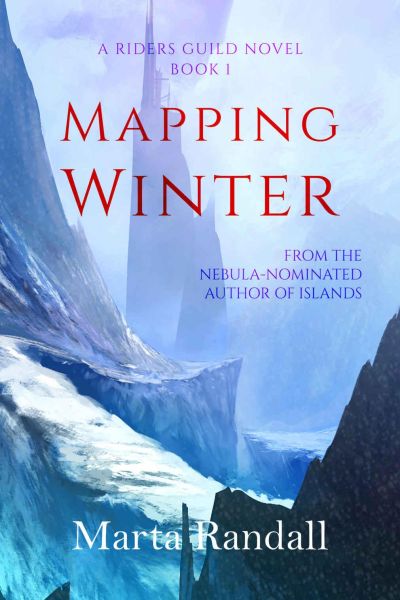Each Merry Man’s Friend
Mapping Winter (Riders Guild, volume 1)
By Marta Randall

19 Nov, 2019
2019’s Mapping Winter is the first volume in Marta Randall’s Riders Guild secondary universe speculative fiction series. It is a reworking of her 1983 novel Sword of Winter1.
Kieve Rider delivers portentous news to the scattered communities of Dalmorat Province. After four decades of autocratic rule, Lord Cadoc Marubin is finally dying. Few will be sad to see the Lord dead, but his death may not bring happiness to his subjects. Cadoc leaves behind an innovative system of secret police and midnight arrests, ugly tools his successor may set aside … or take up.
Kieve Rider despises Cadoc but, having sworn an oath to him, has no choice but to serve. Like the rest of the people of Dalmorat, she hopes Cadoc’s death will bring freedom for her. It may instead send her to her own death.
There are several contenders to replace Cadoc once he dies. While Cadoc’s dull-witted, vicious son Gadyn is deemed to have the best chance, Gadyn’s sister Lady Isbael has a legitimate claim to inherit, as do Gadyn and Isabel’s cousins Cairun and Drysi. Plots swirl through Dalmorat’s capital city of Sterk.
Kieve has no interest in politics or power. She wants to escape her onerous oath so that she can pursue her true love, mapping the kingdom’s wilderness regions. She hates living in cities; the fact that her service binds her to the ruler and the capital is vexing. She also hates the unpleasant duties that Cadoc foists on her. Kieve functions as part of Cadoc’s network of secret police. She may hate her duties but her oath gives her no choice but to do as commanded.
Kieve’s close relationship with Cadoc could gives her some influence on the succession. Were she to show her support of any of the claimants, that claimant might be able to shoulder the other heirs aside. Kieve has no preference; she’d as soon be shut of all of them. The heirs, undaunted, attempt to sway her, by fair means or foul.
Kieve is vulnerable because there are people whose well-being matters to her. Defenseless people. People who can be threatened, abducted, or killed.
~oOo~
I called this book speculative fiction rather than fantasy because I’m not at all sure that it is a fantasy. The book’s characters believe in magic, but that isn’t proof that magic exists in that world. Real people believe in astrology, but that doesn’t make astrology a real science.
A great many secondary world or fantasy works have drawn on pre-Industrial-Revolution Europe for inspiration. The world of Mapping Winter takes its inspiration from periods of change, when steam-engines and telegraphs were transforming the world or when newly discovered lands offered opportunities for trade2. There’s also a hint of later politics: totalitarian states attempting to end opposition with informers and midnight arrests. The dying Cadoc is a proto-Stalin….
Sensible, low-drama regime changes are not among the modern innovations enjoyed by the people of Dalmorat. Potential heirs die messily of stab wounds. As do low-ranking unfortunates who get who get in the way of this or that scheming aristocrat. One begins to understand why Kieve would rather explore the trackless north than live in this hotbed of intrigue and murder.
The world of this novel is deftly drawn, as are the characters. Kieve is convincing: she presents herself as hard-bitten and detached, yet finds herself taking big risks for those she loves. There’s enough narrative suspense to keep readers turning pages. I enjoyed this book. I think my readers might as well.
If her (incomplete) ISFDB entry can be trusted, Mapping Winter is Randall’s first speculative fiction novel in thirty-five years. Welcome her back by snapping up this novel.
Mapping Winter is available here (Amazon US), here (Amazon Canada), here (Amazon UK) but not, apparently, from Chapters-Indigo.
1: Marta Randall was unhappy with Sword of Winter. The publisher had asked her to make changes that she felt were untrue to her vision for the book. Changes that made the book more generic and thus, in the publisher’s eyes, more saleable. She did as demanded. Thirty-five years later she was able to rewrite the book as originally envisioned. See her explanation here.
2: The overseas peoples who have just come into contact with Dalmorat and Cherek, the larger nation of which it is a part, aren’t as technologically advanced as their new trading partners. I suspect that they are not going to find trade relations all that beneficial.
